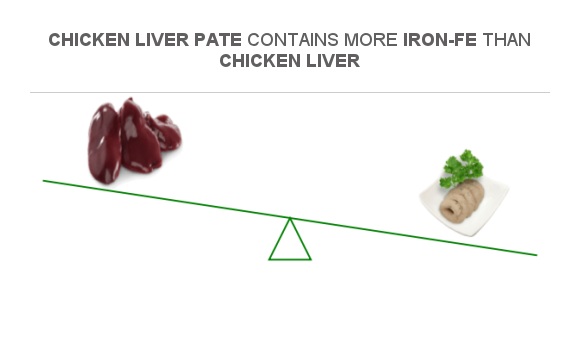Chicken livers are often touted as an excellent source of iron. But are chicken livers really high in iron? And what are some of the other potential health benefits of adding these nutrient-dense organ meats into your diet? In this article we’ll take an in-depth look at the iron content of chicken livers as well as discuss other key nutrients they provide.
How Much Iron is in Chicken Livers?
When it comes to iron content, chicken livers are indeed exceptionally high in this essential mineral. A 3.5 oz (100 gram) serving of cooked chicken livers contains a whopping 12.8 mg of iron. To put that into perspective, the recommended daily intake of iron for adult men and postmenopausal women is only 8 mg. For menstruating women, who have higher iron needs, the recommendation goes up to 18 mg per day. So just a single 100 gram serving of cooked chicken livers provides well over 100% of the recommended intake for most adults!
In comparison to other meats, chicken livers contain substantially higher amounts of iron. For example, a 3 oz serving of braised chuck beef only has 3.2 mg of iron while the same portion of roasted turkey breast contains just 1.1 mg. Looking at plant-based sources, 100% iron-fortified cereals can provide upwards of 18 mg per 3/4 cup serving. However, the iron from animal sources like chicken livers is more bioavailable, meaning more of it is readily absorbed and utilized by the body.
Clearly, chicken livers can be considered one of the richest dietary sources of iron out there Adding just a couple servings of chicken livers into your diet each week can go a long way in helping you meet your recommended iron intake.
Why is Iron Intake Important?
Iron is a mineral that plays several crucial roles within the body. Some of the key functions of iron include:
-
Transporting oxygen – Iron is a key component of hemoglobin, the protein in red blood cells that carries oxygen from the lungs to tissues and organs throughout the body.
-
Energy metabolism – Iron is required for the production of adenosine triphosphate (ATP), the energy molecules that fuel cellular processes.
-
Immune function – Iron is needed for the activity of immune cells that defend the body against foreign invaders.
-
Brain function – Iron supports neurotransmitter synthesis, which enables communication between nerve cells in the brain.
When the body does not have enough iron, it leads to a condition known as iron deficiency anemia. Symptoms can include fatigue, pale skin, headaches, shortness of breath, and decreased immune function. Ensuring adequate iron intake through iron-rich foods like chicken livers can help prevent iron deficiency.
Benefits Beyond Iron in Chicken Livers
While the exceptionally high iron content of chicken livers is a major benefit, these nutritious organ meats also provide a variety of other important nutrients:
-
Protein – Chicken livers are a high quality source of protein, providing 18 g per 3.5 oz serving. Protein provides amino acids that are used to build and repair tissues throughout the body.
-
Vitamin A – A 3.5 oz serving of chicken livers contains over 300% of the recommended daily intake for vitamin A. This essential vitamin supports immune function, vision, and cellular communication.
-
Vitamin B12 – Chicken livers are one of the richest sources of vitamin B12, an essential nutrient involved in red blood cell formation and neurological function.
-
Folate – Also known as vitamin B9, folate is crucial for DNA synthesis and new cell formation. A 3.5 oz serving of chicken livers packs over 90% of the RDI for folate.
-
Copper – Chicken livers provide substantial amounts of the mineral copper which aids iron absorption and contributes to connective tissue health.
Clearly, the benefits of chicken livers expand far beyond their stellar iron content. Adding these livers into your diet provides a powerhouse of nutrition to support overall health.
Incorporating Chicken Livers into Your Diet
If you aren’t already eating chicken livers regularly, here are some simple ways to start incorporating them into your diet:
-
Liver pâté – Purée chicken livers with herbs, shallots, butter or olive oil, and spices for a smooth, spreadable pâté to enjoy on crostini or crackers.
-
Add to pasta – Sauté chicken livers with garlic, olive oil or butter, and fresh herbs and mix with hot pasta for a quick weeknight dinner.
-
Top salads – Seared or sautéed chicken livers make a tasty protein addition to any salad.
-
BreakfastUpgrade – Fry some chicken livers with onions and spices and add them into your morning omelette for an iron boost.
-
Smoothies – Blend a small amount of cooked chicken liver into your berry or green smoothies to add a nutrient kick. Start with just 1-2 tablespoons and work your way up to more once accustomed to the flavor.
When preparing chicken livers, opt for cooking methods like sautéing, pan frying, or roasting which help maintain the integrity and nutritional value of the meat. Avoid boiling for prolonged periods of time.
The Takeaway on Iron and Chicken Livers

Your cart is empty
Log in to check out faster.
Are Chicken Livers High In Iron
FAQ
Is chicken liver good for iron deficiency?
Yes, chicken liver is an excellent food for addressing iron deficiency. It’s a rich source of heme iron, which the body absorbs more readily than non-heme iron found in plant-based foods.
Which liver is highest in iron?
Liver is fantastically rich in many nutrients and is outstanding for iron. 100g of raw lamb liver has 10.33mg, chicken liver 9.8mg and beef liver 5.8mg.
How often should I eat liver for iron?
Typically once a week is recommended. I would suggest liver from pastured/grass fed animals gently cooked in butter, bacon grease, ghee or lard from grass fed animals. You might also consider lamb liver which can be absolutely delicious and a bit lighter than beef liver.
How to cook liver for iron deficiency?
